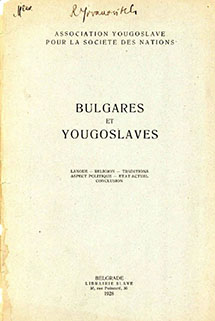
Bulgares et Yougoslaves
booklet published by the "Jugoslav Association for the League of Nations". Content: Language - Religion - Traditions - POlitical Aspects - Current State of the Art - Conclusion
More...We kindly inform you that, as long as the subject affiliation of our 300.000+ articles is in progress, you might get unsufficient or no results on your third level or second level search. In this case, please broaden your search criteria.

booklet published by the "Jugoslav Association for the League of Nations". Content: Language - Religion - Traditions - POlitical Aspects - Current State of the Art - Conclusion
More...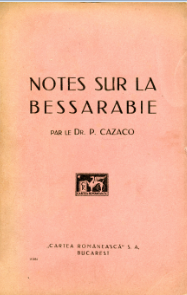
Inspired by passions and diverse interests, these studies on Bessarabia are often far from edifying public opinion. We will therefore endeavor to shed light on this issue, by supporting the following pages with authentic dates and documents, excluding any prevention and any special interest. Published by Cartea Romaneasca, Iaşi, 1926
More...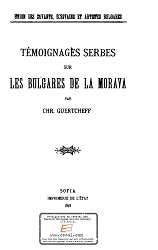
instead of an Abstract please read the" Introduction.PDF" of 2.5 pages which you can download free of charge from "Content" Tab here.
More...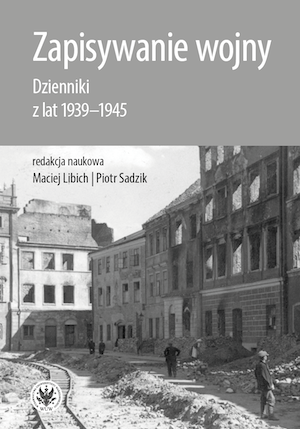
Written in four languages in the margins of a French book, the diary of Abram Icchak Łaski remained anonymous for many years, although it aroused a keen interest in Holocaust scholars both in terms of its form and content. Only recent research has allowed to discover the author’s name. The article presents new possibilities of text interpretation, which appear along with getting to know the identity of the diarist and his milieu.
More...
This article analyzes the wartime fate of two archival and library collections and two archivists/librarians who took care of these collections during the hostilities in two cities – Lviv and Warsaw. The analysis was based on diaristic documents: Aleksander Czołowski’s "Dziennik wypadków listopadowych" [Diary of November Events] and Józef Grycz’s "Dzienniczek z okresu powstania warszawskiego 1944 roku" [Diary of the 1944 Warsaw Uprising]. The first diary describes the events that took place in Lviv during the Polish-Ukrainian war in 1918, especially Czołowski’s efforts to take care of the city’s archival collection. The second diary highlights the Warsaw Uprising struggles in 1944 and, above all, Grycz’s personal struggle to protect the collections of the National Library from destruction or robbery. Both diaries are interestingly profiled documents of their time. They present the battles of Lviv and Warsaw, respectively, from an unusual perspective: that of the institutions of science and culture, as well as the documents and books collected in those institutions, whose material dimension suddenly became fundamental (because fundamentally endangered). In this way, both diaries make us aware that wars, especially those fought in urban areas, are both tragedies of people and hecatomb of things, including books. At certain points both diaries also shed untypical light on events integrated in the dominant Polish discourse and rarely narrated in a way that deviates from it.
More...
In my paper I focused on presenting some of the notes made by Wacław Borowy in 1943–1944 that are unknown to a wide audience. I look not only at the content of the scholar’s diary, but also at its physical aspect. By referring to the works of Paweł Rodak, Philippe Lejeune and various achievements of genetic criticism, I try to answer some of the key questions. Why does Borowy follow the actions of the Soviet troops? How does he perceive life in the occupied capital city? How does he hide his involvement in the works of the underground University of Warsaw? Another field of research are scholar’s notes that were made during the Warsaw Uprising. The laconic, “encrypted” (according to Maria Straszewska’s term) entries, which were predominant up to that time, are replaced with notes in which Borowy makes many detailed comments regarding the uprising. Thus the reader of this article will get to know a hidden face of Wacław Borowy. The man who tries to keep in his tiny notebooks the memories of the world in which, in his own words, “besides sins, there were so many great values!” A witness to history who reads subsequent decisions concerning the post-war fate of Poland with curiosity.
More...
This article is an attempt to provide an analysis of the diary kept by the poet Konstanty Ildefons Gałczyński during his imprisonment in Stalag-XI POW Camp in Altengrabow. Written in 1941, the diary remained unpublished until some 50 years after the author’s death. We will not find any of the poet’s stylistic methods in the entries. Religious themes dominate, as does the necessity to adapt personality traits. The diary throws light on the poet’s post-war works.
More...
In the article I conduct the analysis of Stefan Themerson’s wartime diaries. Notes from 1940–1942 are exemplified in seven volumes of manuscripts, currently held in the Themerson Archive in the National Library of Poland in Warsaw. I point out that the intimate practice of the avant-garde artist was an incidential activity. I assume there were not any further or previous traces of this kind of autobiographical writing. Combining the methods of life-writing studies and genetic criticism, I put forward a thesis that the diaries of Themerson are an interesting record of the formation process of Themerson anti-political statement.
More...
The subject of this chapter is the issue of the daily dating of poems written between 1939 and 1945. The key question concerns the significance of this particular practice. The notion of kairos proves useful in explaining it.
More...
This article is the result of a review of the writing materials of Krzysztof Kamil Baczyński to identify manuscripts with the characteristics and functions of a diary, and at the same time an introduction to genetic research on the poet’s codexes. The first part of the article contains a comparison of the manuscripts in the above mentioned key, leading to a presentation of the predominance of lyric autographs: numerous and related to the various functions they had, with a marginal share of non-literary texts, among which – if it ever existed – a diary could be found. Brief analyses of a letter from Stawisko from March 1942 and selected author’s footnotes from [Codex 39/42] demonstrate the secondary role of personal notes in relation to the lyric, which is the poet’s way of “noting” experiences and testimonies. The second part introduces the study of the codexes, analysing those elements of them that correspond in functionality to the elements of a diary. Particular attention is paid to the components and features of notebooks relating to the temporality of their creation considered in various aspects: dating, chronology, the period of the creation of notebooks, the mode and regularity of their keeping. [Codex 39/42] and [Codex 42/44] are framed as the result of a writing practice similar to diary-keeping with respect to their material integrity, which is an introduction to the study of the poet’s notebooks taking into account their material and pragmatic dimensions.
More...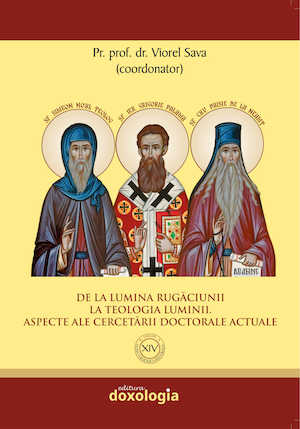
The Holy and Great Council of the Orthodox Church is admittedly one of the most important Orthodox ecclesiastical events of the 21st cent. The Council’s 2016 convening was finally made possible after a very long and arduous preparatory process of circa 93 years, in which process the Patriarchate of Romania appears to have played an important and constructive role. In fact, the Church of Romania, in 1920, shortly before the official preparation begins, dispatched Prof. Dragomir Demetrescu to the Ecumenical Patriarchate with the mandate to exchange views on the possibility of convoking a “Council of the Orthodox Churches”, and to propose potential issues to be considered in such a Council. Since then, the Church of Romania has responded positively to all the relevant invitations of the Great Church of Constantinople and participated constructively in all the preparatory bodies and phases of the Holy and Great Council, while the Romanian Primates - from Patriarch Myron to Patriarch Daniel - demonstrated a profound synodical awareness and fought devotedly for the unity and cooperation of the Orthodox Churches. The current article has a double scope: on the one hand, it presents the historical contribution of the Patriarchate of Romania at the beginning of preparation of the Holy and Great Council of the Orthodox Church, and on the other hand, it attempts to evaluate it.
More...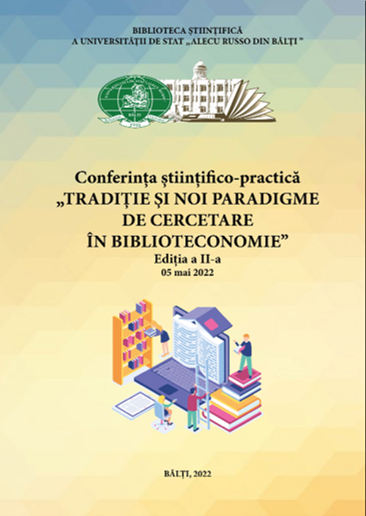
The article highlights the rare book collection of SL USARB „Useful Knowledge", published in the interwar period by the most prestigious and oldest publishing house in Romania - Cartea Românească. Some moments from the biography of the collection are reviewed: the history, the structure, as well as the variety of the contents. The value of the collection consists in familiarizing the reader with information from various fields of human knowledge, the editors being firmly convinced that the healthy training of the youth will contribute to the progress of the country and the nation.
More...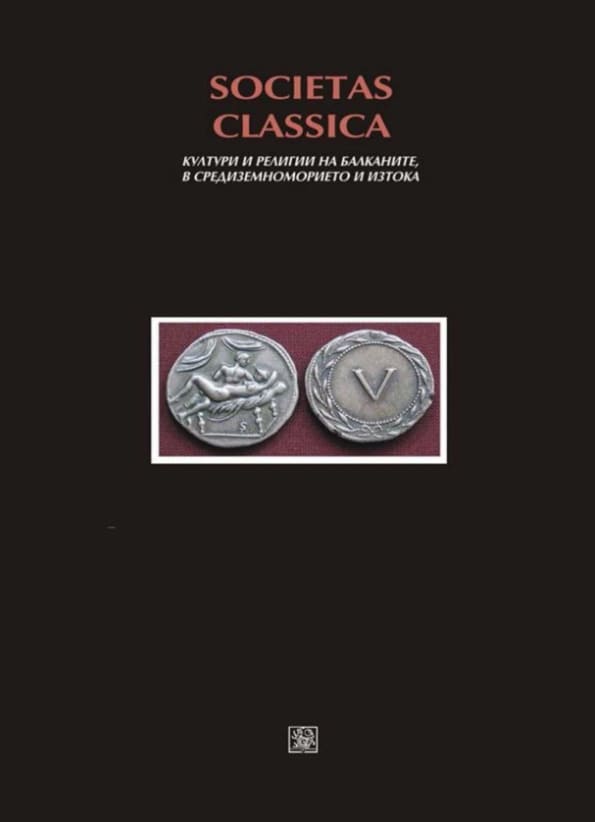
The paper discusses Colin Thubron’s book Behind the Wall: A Journey Through China – one of the most popular twentiethcentury travelogues about this country. It explores the various ways in which the author constructs the image of the Chinese people, especially when these images are related to China’s recent history. More specifically, I focus on a discursive phenomenon – an imagined “return of history” – which the reader can witness throughout the book. The author constantly travels around the country, expecting to somehow see the history he has heard so much about at home. He expects something from China and is prepared to see this ‘something’ even in the face of the evidence. At the same time he feels he has every right to pass judgments on what he perceives as history, while denying the Chinese he meets the right to comment on British history.The paper discusses Colin Thubron’s book Behind the Wall: A Journey Through China – one of the most popular twentiethcentury travelogues about this country. It explores the various ways in which the author constructs the image of the Chinese people, especially when these images are related to China’s recent history. More specifically, I focus on a discursive phenomenon – an imagined “return of history” – which the reader can witness throughout the book. The author constantly travels around the country, expecting to somehow see the history he has heard so much about at home. He expects something from China and is prepared to see this ‘something’ even in the face of the evidence. At the same time he feels he has every right to pass judgments on what he perceives as history, while denying the Chinese he meets the right to comment on British history.
More...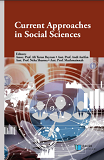
The aim of study is to analyze the İsmet İnönü era in Turkey during his tenure while concentrating on the challenges and shortcomings of democracy. The study will focus on various dimensions, including political restrictions, limitations on freedom of expression, one-party rule, electoral systems, socio-cultural factors as well as economic policies in order to offer a detailed examination of the complex dynamics which shaped the democratic landscape of Turkey of the time. Studying the mentioned dimensions is expected to uncover the factors which led to the inadequacy of democracy during the İnönü era and eventually to evaluate their implications for Turkey's democratic development, which on the one hand encompasses the succession from Mustafa Kemal Atatürk and the Republican People's Party's (CHP) dominant role and on the other hand emphasizes the consolidation of power and the challenges to political representation. Particularly, the analysis of electoral practices can provide insights into the limitations of democratic processes, such as restrictive laws, voter intimidation, and limited political pluralism. Moreover, the study will examine the impact of these challenges on democratic decision-making which would include but not limited to the centralization of power, the marginalization of opposition voices and their meanings for citizen participation. The study will also try to evaluate the restrictions on freedom of speech and the media landscape, discussing the limitations imposed on critical voices, media control, and its consequences on public discourse and democratic participation. In addition to these, the study is expected to assess the socio-cultural dynamics which would focus on İnönü's modernization policies and their impact on social transformation. The study will explore the tensions between traditional values and cultural constraints, too. This will be carried out by highlighting the challenges faced by less represented groups and the inclusiveness of the political system. The economic policies of the İnönü era, including the economic vision and development strategies will be scrutinized, with particular attention given to the socio-economic disparities and their effects on democratic participation as well as political power dynamics. Furthermore, the study will attempt to examine the international relations and foreign policy approach of İsmet İnönü. This examination will be through the consideration of the implications for democracy and Turkey's international standing. The influence of external factors on democracy in Turkey during the mentioned timeline will also be assessed. Finally, the study will be concluded with the evaluation of the legacy of the İnönü’s era, weighing the democratic gains and losses while drawing lessons for Turkey's democratic development and considering the implications for the post-İnönü era. This comprehensive analysis is expected to contribute to a nuanced understanding of the İsmet İnönü era's impact on democracy in Turkey which could highlight the complexities and challenges faced during his tenure. The critical examination of the various dimensions, the study will provide valuable insights for scholars, policymakers as well as for any expert who is interested in Turkey's democratic history and in the ongoing democratic journey.
More...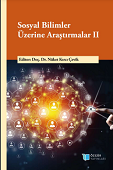
This study will analyze the lifestyles of Sephardic women in the Turkish city of Istanbul from the 1930s through the 1980s collected via oral history interviews from a Centropa project by Sephardim from Istanbul. The interviews with Turkish Sephardic women in the Centropa interview database will be supported by research conducted in the Şalom Newspaper archives in Istanbul, the Turkish Official Journal archival database research, as well as historical and anthropological material search at libraries. As Sephardic Jews speak Judeo-Spanish, this study aims to shed light on Judeo-Spanish words used by Sephardic women on social activities, emphasizing the importance of the Judeo-Spanish language. Besides, this study also aims to analyze the societal roles of Sephardic women as professionals, their pastime activities, their culinary traditions, the historical information about their quarters’ surroundings, and the occupations that disappeared, underlining the importance of the reforms Atatürk brought to all the women living in Turkey as a way of history and culture education.
More...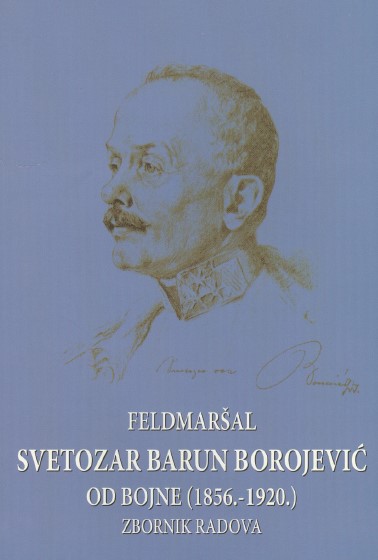
Setting forth from the assumption that encyclopaedia-production in any country reflects the time in which it emerges, the objective of this work is to explore any possible divergences in the treatment of the life and deeds of Borojević among the encyclopaedia entries of various nations. Stated differently, the objective of this research is to ascertain whether there were encyclopaedia entries that were influenced by or were in correlation with the origin of the national encyclopaedic source, with the specific encyclopaedia-production of a given nation. In this context, emphasis will be placed on an inter-lexicographic biographical comparison of national biographical lexicographic entries and an examination of any differences in interpretation in the approach to the material, which may have been caused by the heterogeneity of national lexicographic sources and approaches. The basic hypothesis lies in examining the assumption that the framework of national lexicography focuses on a specific vision, and the objective of this work is to detect these views as encapsulated in biographical lexicographic entries as research units during the period from the 1920s to the present. In methodological terms, the work presents an attempt to ascertain the approach and analysis in articles about Borojević and, in this sense, the focus is on a more factual description of encyclopaedia entries than an analytical and critical approach to their sources, without moving beyond the factual generalizations contained in the encyclopaedic entries. The overview of encyclopaedia entries is based on the assumption that encyclopaedia entries reflect the spirit of the time, and that the idea that lexicographical entries personify the spirit of the time within all limits of national/state or ideological provenance must be either confirmed or refuted.
More...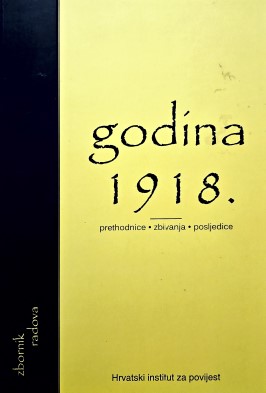
With the outbreak of the war and the collapse of the Austro-Hungarian Monarchy Bosnia and Hercegovina became a centre of “national concentration” and the newly proclaimed state. The government of the Kingdom of Serbs, Croats, and Slovenes was taken over by the Serbian political elite which ascribed to Bosnia and Hercegovina the role of a unified area which would prevent the creation of any kind of Croatian state while strengthening the newly created state and the Serbian dominance within it. The new government established its authority through terror and violence directed against the non-Serbian peoples. It attempted to undermine every political action or publicly expressed demand of the Croats for a federal unit, or an independent state. Mu-slims saw their land confiscated through the Agrarian Reform, which while in part brought to an end feudal relations and corrected historical injustices, also materially ruined numerous families. In harmony with Serbian political tradition the Constitution and other agreements merely acted as “manifestations” to appease “European public opinion.” The interests of other (non-Serbian) peoples were treated as illegitimate or anti-state activities: nationalism and separatism. Various repressive measures were directed at individuals deemed to be the carriers of these interests. Territories in the new state toward which the government lacked sympathy for national or political reasons and which did not figure into particular plans for unitarism were systematically destroyed and neglected. The key argument for unitarism and centralization was a call to the rights and “decisiveness” of the Serbian people, which was intermixed among the others to bring them to “belong to Serbia.” In this spirit the Vidovdan Constitution was brought into being which eliminated historical rights and historical lands, and created the basis for further unitarism and centralization of the state, but likewise strong reasons for dissatisfaction and resistance. States are determined by the nature of their formation. The Kingdom of Serbs, Croats, and Slovenes came into existence due to historical circumstances as an intellectual creation and not the result of national development. Primarily, violence was used to impose “unity” and centralized government.
More...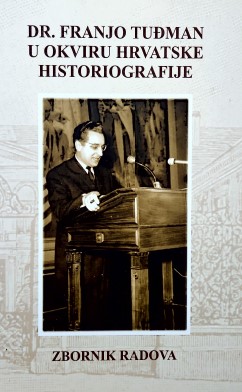
As a historian, Franjo Tuđman arrived to important conclusions about the relations between Croats and Serbs and the internal and external causes of the situation and the crisis in the country that was ultimately going to cause its breakdown in his research of the Kingdom of Serbs, Croats and Slovenes/ Yugoslavia in the period between 1918 and 1941, and in his research of Croatia’s position therein. Analyzing archive sources and other materials, along with relevant literature, Tuđman looked into the organization and the actions of the repressive system of monarchist Yugoslavia’s regime in Croatian territory and their dealings with the Croatian people. He recognized the basic elements of Serbian hegemony in the Kingdom of Serbs, Croats and Slovenes/ Yugoslavia, the Vidovdan centralist regime and the struggle to preserve it at all costs, proving that it would all have been impossible without the principal exponents – the king, the army, the gendarmerie, the police, the state administration, the judiciary, the government, and the political parties. Tuđman proved how King Alexander Karađorđević, supported by his loyal army and gendarmerie, established himself as the top authority in the country since the very beginning in 1918, and how Serbian political and ruling elite gathered around his court and him personally. The constitution gave him authority over the parliament, which he made full use of in the practice, and the parliament held a subordinate role for the entire time. This role of the king and his courtiers would remain unchanged until the end of monarchist Yugoslavia. The army with the king at its helm was, in Tuđman’s opinion, the second most important factor. From the very beginning the army had been built as the principal instrument of Great-Serbian hegemonist and counter-national politics and of Serbian hegemony, fully living up to the role in reality, preserving the monarchy and its centralist and hegemonist system, and serving as an active factor of the state politics until its breakdown in 1941. The army was a tool in the hands of the court that was used as counterweight to parliamentalism and the strivings of political parties to run state politics. Considering the significance of the army for the ruling structure, the expenditures for the army remained at a very high level continually, often having a considerable negative impact on the development of the economy in non-Serbian territories.
More...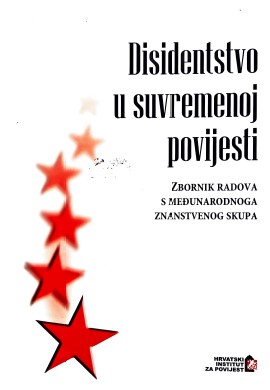
The opus of the lawyer Ivo Politeo (1887-1956), rich as it is encompasses a wide intellectual and chronological framework. This research text provides an arena to consider Politeo’s reactions to the unbridled encroachment of the state into the autonomous civil sphere in the historical context of Monarchist and Communist Yugoslavia. For Politeo’s understanding of political power in the epoch of Monarchist Yugoslavia (from 1920 to 1941) his cooperative efforts with the journal Nova Evropa [New Europe], a subject that has not been written about at all, is particularly important. Nova Evropa appeared on Zagreb’s intellectual horizon in 1920, covering such fields as politics, litera-ture, contemporary history, law and anthropology. The range of criticism of Yugoslavia’s pseudo-Parliamentarianism offered by Politeo and the intellectual circle around Nova Evropa is well-illustrated by the document known by the title “the Zagreb Memorandum’’ which came to be on 4 and 5 November 1934 wherein it was requested of the Regency to restore civil freedoms to the people. The other major current of Politeo’s discourse during the 1920s and 1930s was directed at concrete legal practice in the domain of the extraordinary Yugoslav laws which incriminated politically penalized acts. These laws were the core of the instrumental violence of the state apparatus and the spread of the web of the police. In his homeland Politeo is above all known as a defense lawyer for people of quite varying ideological orientations and as the author of the book Politički delikt (1921) in which he rejects the notion of mixed political offenses because “there are no pure of mixed absolute or relative political offenses but rather only ‘political offenses’ whose motive and purpose is political’’.
More...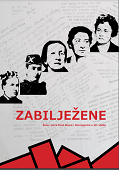
U ovom poglavlju ukratko će biti predstavljen period od početka Prvog svjetskog rata do početka Drugog svjetskog rata u Jugoslaviji 1941. godine u kontekstu djelovanja žena. Na samom početku dat je kratak pregled historijsko-društvenih okolnosti, a nakon toga prikaz ženskog udruživanja, prava za koja su se zalagale te faktora koji su otežavali ili donekle olakšavali njihovo djelovanje. Također je dat osvrt na ekonomska, socijalna, obrazovna, građanska i ostala prava žena u ovom periodu, kao i na prilike u književnosti i pozorišnoj umjetnosti. U ovom poglavlju se prilikama u Prvom svjetskom ratu gotovo uopće ne bavimo uslijed nedostatka literature o tom periodu. Kako ne želimo da vrijeme izbriše i njihove biografije i doprinose, na kraju poglavlja navodimo sasvim kratko informacije o njihovom životu i radu, unaprijed žaleći što mnoge žene ovog perioda ni na stranicama ove knjige neće naći svoje mjesto.
More...